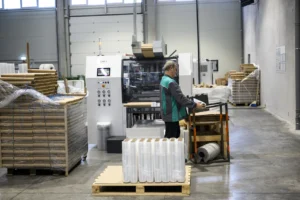Sustainable Solutions: A Push Toward a Circular Economy
- Home
- Sustainable Solutions: A Push Toward a Circular Economy

- Economy
- By Admin
- Comments (0)
In Bistrița, northern Romania, a hangar-sized factory floor is filled with spotlessly clean machinery which is linked together by gleaming silver pipes. Recently opened, the Opal Stretch Film factory is predominantly automated, with the whistle and buzz of technology filling the air. The smell of plastic hangs heavy, and a strong warmth emanates from the humming machines.
The large spinning rollers generating heat in this factory produce stretch film. Ubiquitous for wrapping luggage at airports around the world, the product is used for a wide spectrum of applications, from securing pallets in warehouses to ensuring that retail products remain pristine during transit.
Part of the TeraPlast Group, the Opal factory is the latest addition to Eastern Europe’s largest plastic polymer processor. TeraPlast is not only focused on creating industry-leading products: sustainability also dominates the company’s corporate goals.
Over 80 percent of the technological water used by TeraPlast is now recirculated. In Bistrița, the wastewater from production passes through two treatment plants in the TeraPlast Industrial Park before being discharged into the Sieu river, ensuring plastics are kept out of local waterways.
TeraPlast’s products also use up to 30 percent recycled material, a key pillar of the company’s goal to reduce its impact on the environment by developing products from environmentally friendly materials and contributing to a circular economy transition.
The use of recycled raw materials has steered TeraPlast’s development strategy for over five years, both through the company’s direct involvement and investment in recycling activities, and through the purchase of recycled materials from the market.
This philosophy has filtered down from the top. “When it comes to sustainable production, TeraPlast has always been ahead of the curve,” says CEO Alexandru Stânean.


From pollution to progress
Because of its unique, durable properties, plastic has become essential to many facets of modern society. But the production, consumption and disposal of plastic can often result in significant negative impacts on society, the environment, and economy.
Plastic pollution in the world’s waterways is a global problem. It is estimated that every year 19-23 million tons of plastic enters aquatic ecosystems, polluting lakes, rivers and seas.
This pollution negatively impacts millions of livelihoods, impedes food production capabilities, and affects social well-being. It can also have negative effects on ecosystems, altering habitats and natural processes, in addition to reducing the ability to adapt to climate change shocks. The global cost of plastic pollution is estimated at $20 trillion, with packaging accounting for 40 percent of all waste.
“In Romania, plastic waste has become a major environmental problem,” says Monia Martini, Senior Project Manager for World Wildlife Fund (WWF) Romania. “The first to suffer are local communities and their economies.”
A constant presence in the natural environment, a WWF study has shown that 56 percent of Romanians believe that there is too much waste in nature, which is having a negative impact on both the environment and local communities.
“In addition to the impact on ecosystems and human health there is also a cascading economic impact on services such as ecotourism,” she adds. “For Romania, it is important to acknowledge that plastic pollution is a complex problem, and that a systemic approach is needed towards finding the right solutions.”
“To achieve this, it is vital for the private sector to act quickly to prevent by transforming its production, distribution and waste management systems,” says Martini.




Leave A Comment